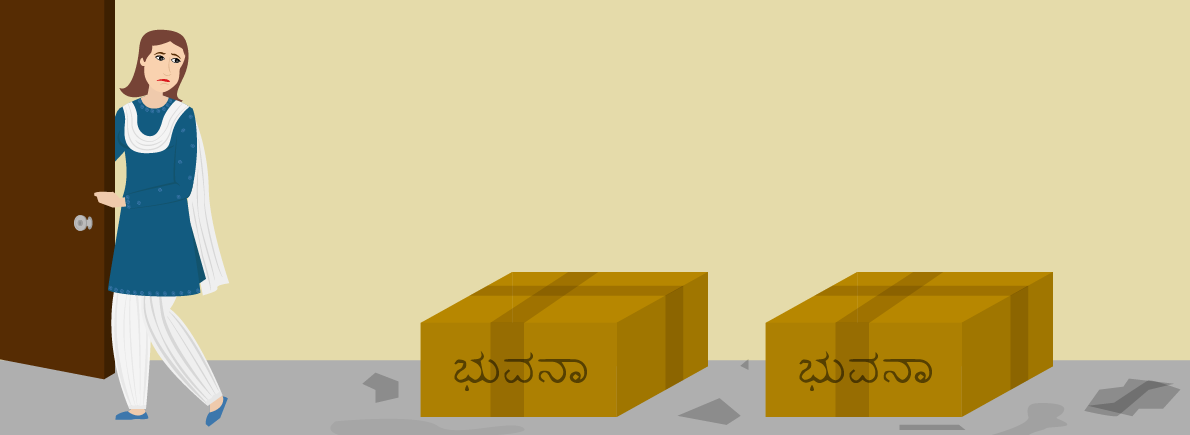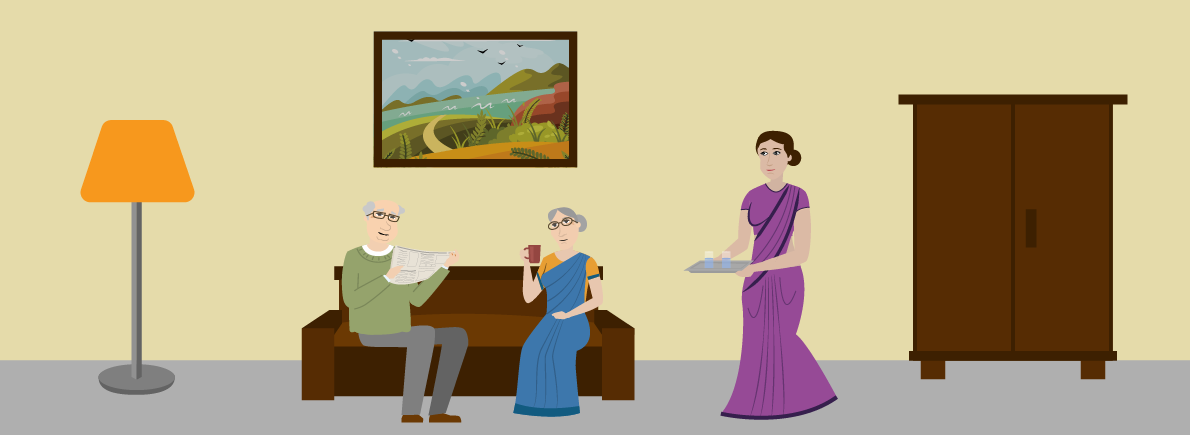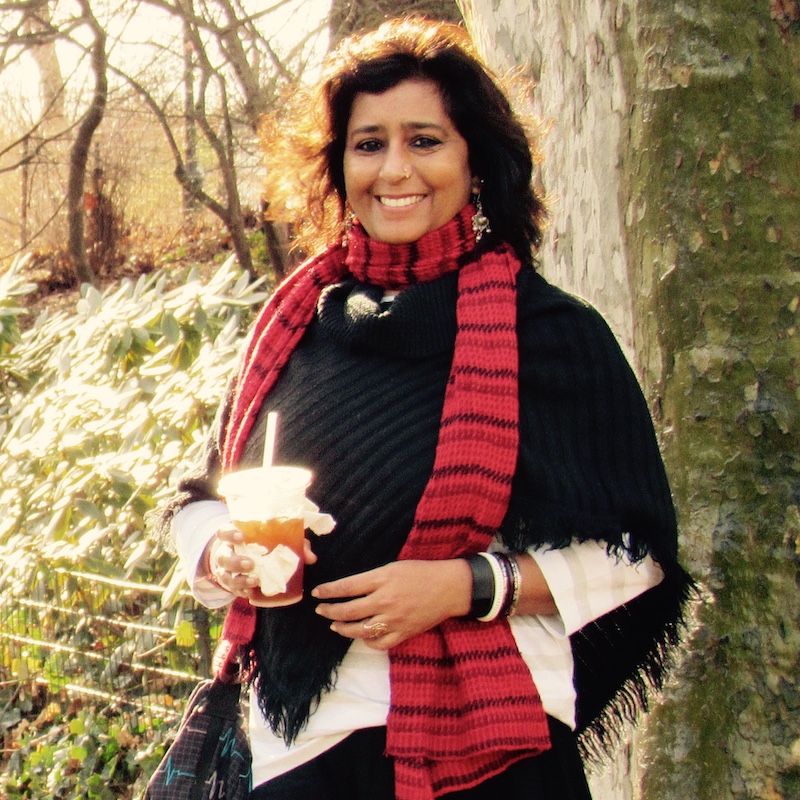Fiction
A Debt, Unpaid
Kamalini Natesan
December 13, 2018
We organised an online writing community where we gave 30 prompts over 30 days, and all the members had to write a complete story based on the prompt of the day. Kamalini was part of the group and wrote this story in response to our prompt – The Sound Of Silence. It was initially much shorter, but we loved it and wanted to publish it, so she expanded on it and made it into what you will read now. Many of us living in India have some form of house help but not many of us form deep bonds with them. They are in our houses daily and are truly part of our lives, yet how often do we pay attention to them, or form relationships with them? This story explores the anguish a lady feels after her house help mysteriously disappears. She does discover her again, but is in for a surprise.

1995
I recall clearly, it was just the previous day that Bhuvna had come over to sweep and clean out the rooms in which our luggage was lying all around, nicely packed by the expert movers, PN Writer. The following day, she did not return for her money, nor to bid us farewell. It was totally unlike her. She loved us, and we loved her right back. Was she so upset that she couldn’t bear to see us leave? Had something happened to one of her four children or her handicapped husband? Was she merely distraught? Myriad rationalisations were drumming upon my mind. This didn’t fit in with her character or her caring and righteous being. I had always counted on Bhuvna appearing at our doorstep, at exactly the same hour, day after day.
Bhuvna, one could say, was our staunch rock of Gibraltar. When all else failed, Bhuvna steadied me, come day or night. That was how it was, that’s who she was.
My uneasiness grew exponentially as the movers hauled one carton after another, loading them onto the waiting monster of a truck. How much stuff we had collected, all four of us hoarders! Two cartons containing clothes, toys, some steel utensils and other wares that I felt no longer had a place in our home, had Bhuvna’s name on them. As the number of cartons thinned rapidly, my heart pounded faster and faster. There were only ten left, which meant the next lot would be the last one, and we would then shut the door on our past, possibly forever.
Within a trice, the last lot was gone, and all that remained in the middle of a very dusty living room were the two cartons with BHUVNA inscribed on them, in Kannada. One of the workers had scripted her name for me, lest they get mixed up with the other boxes. It shone in the sunlight, almost beautifully, as the disturbed dust flew around it. Her name rose and hung around our home, and around my head and heart. I couldn’t leave without giving her a hug, telling her, with a quick exchange in broken Kannada, how much she had mattered.
An hour went by, the truck left, and the car arrived to pick me up and awaited my descent into the parking lot.
The stillness of those cartons hurt badly. I couldn’t bear to leave, but I did. Our move to Gurgaon happened, and we gradually settled in, but I could never get over the lack of a proper goodbye to Bhuvna. Even as my new life took over, time and time again it would arise to haunt me, and new helpers in the north were unable to fill this void.
May 2000
It’s been a month since we’ve moved back to Bangalore and I’ve yet to find the time to look for Bhuvna. I’m sure she’s in the same area, having found work in a home like ours. She’s not particularly efficient, but she made up for this lacuna by her caring nature, so I do hope her new ‘lady-of-the-house’ (mistress is such an awful sounding word, isn’t it?) has a soft spot for the Bhuvnas of this world – women with large hearts, and a willingness to embrace it all with a smiling mien. Work, well, it can be taught, but one can always seek solace from the fact that their home is bright and warm at all times, if not impeccably clean. That’s how it worked between Bhuvna and me. She would bring in her sister occasionally, and they’d sweep the floors in a dance of quick motions, I would imagine this is how they do it in Spain, and beat the furniture, raising dust. I’d be busy with my life, coming and going as I pleased. The comfort of her presence was enough of a reassurance. My home was cared for, and my children would be fed her soft dosas with the gunpowder that they had so grown to love. And Bhuvna made a mean biryani– my two would wait for Sunday when the house was filled with its divine aroma. The husband, the sworn vegetarian, would wait just as zealously, looking up from the newspaper every few minutes. “The veggie one is also happening, right? The aroma is killing me. Oh, how I wish I ate what you guys eat!”
Later, at the dining table, we would tease Mohan, asking him to dig into our food. Our Sundays were fabulous, and I do think I owed Bhuvna that merriment. Oh, and that wonderful, wonderful presentation. She was just the best. I miss her every day.
I must look for her. I should take time out from settling in and find her. This settling in phase can be unending, and I can’t wait anymore- it’s going to be a hell of a reunion I reckon. She will be surprised, and just as mirthful as me, that I know.
Another Day in May
Believe it or not, I ran into her younger daughter, the one who had quit college to work in a store. She looked so well, yet was very evasive about her mom’s workplace. I have managed to wrangle her father’s mobile number. I will call Mahesh tonight. Better brush up my Kannada with our new woman helper, Lata.
June 2000
Mahesh does not call back, and I have inevitably received a switched off message on the mobile number given to me. Mysterious. Looks like Lata will continue to build her own niche in our new home, as others have before her. She’s slow, she doesn’t cook well, but she’s a good cleaner. She’s quite a contrast to Bhuvna, she doesn’t talk at all. But one’s got to count one’s blessings. When I’m home, I watch her slow movements, and I see no dance, I hear no music. What I do observe is a tired woman, bent by the burden of a life. What I also note is the complete lack of energy when I open the door at seven in the morning, no quick wish, or even a smile. I don’t for a minute believe she is not respectful, because she is. She offers me tea and she senses that she mustn’t sweep when Mohan and I are in the living room, talking animatedly about our children. The manner with which she looks up when the doorbell rings and then rushes to open it, even when I might be closer, is telling of her nature. One just knows she’s not a bad sort, there’s enough evidence of that, but my Bhuvna, she is not.
Robin, our younger, is now 15, and she does look at him with affection, offering him a snack, which he often refuses, having graduated from dosas to salami sandwiches. Meera, our older, is in college, so she and Lata never meet, or barely ever. They don’t get the opportunity to develop a bond. It’ll get there perhaps, in a few months. Lata is nice and gentle. I can live with a silent maid.
When I think back to the time when Bhuvna ruled the roost, the kids were so much simpler and were easily satisfied. Bhuvna knew exactly how much Horlicks had to go into each glass of milk, she’d prepare it before she left for the day. Her dosas were unbeatable, and her chutneys, as one might say, were to die for. Lata is no match there.

July 2000
I have to look for an old age home, as directed by my older brother, Rohan. Well, Maa and Bapi aren’t getting younger, and he won’t return, not now, not ever. His only child is content in Vancouver, and Rohan and Bidya Boudi, my sister-in-law, will not leave the foreign shores they adore so much to return home. And of course, Maa and Bapi cannot, and will not, move in with me, their daughter. That’s how it is. Now to find our parents a nice home, because Rohan will spare the money, and I, the time.
Two Weeks later, still July 2000
I have not succeeded in finding either the old age home or Bhuvna as the weeks go by. I have an appointment at the very Brit-sounding, ‘GlennClose Country Home For The Aged’, to inspect and approve of. I have already shared details with Rohan and Bidya, who’ve had a look online and already approved it. I think it’s the best money can buy. Rohan has been kind enough to have already transferred a large sum, in case one has to pay upfront. I’m quite pleased since there aren’t too many choices in the high-end sector for oldies. Maa and Bapi are pretty fit for their age, 65 and 75 respectively. Living with me wouldn’t have proved an ideal situation for us, as a family, but with time, one learns to live with and survive even one’s closest living relatives. Earlier, I recall, many, many years ago, not without some irony, Rohan and I fought over who would live longer with the parents. Later, we squabbled over who would get to have them over for long periods. Currently, we are at a stage where both of us are so busy with our respective routines and families, that we rarely, if ever, ask one another who wants them over for the customary two-month stay. I would be surprised if this were an unusual phenomena as children get older. Many of my friends face a similar dilemma with their ageing parents.
Maa and Bapi have complained about the growing distance between us and them, as is expected. Mohan is a good husband, but a wary son-in-law, not indulging them much on their visits. They are also wary of him and keep a respectful distance. As for me, I’m divided. I do care for them a lot, but being around them for more than a couple of weeks can wear me down. The kids and grandparents share no common ground, so my parents and I, and they and their mom, we form two very separate entities. My emotions are wrung clean out of me. One good cuppa made by Lata does perk me up.
When Bhuvna was around- and I keep remembering her as an intrinsic part of any family event- she served my parents unerringly. She would arrive earlier, and leave later, rolling out fresh chapatis, tossing up a lemon rice, or uttappams, just the way they loved it. Sometimes I felt she was dearer to them that I was. I didn’t mind, but, on occasion, it irked me that they would shout for her, and not for me. I wonder why. After all, she was only freeing me, wasn’t she? After all, I was, and am, the daughter, and while I could be perceived as failing in my duties, I was certainly an efficient housekeeper who delegates well. I don’t want to think about it right now, I just want to find Bhuvna.
August 2000
Life surprises me, constantly. On my visit to inspect GlennClose Country Home For The Aged, I found Bhuvna, though I think I had lost her much earlier.
It was a lovely morning, and I was full of hope. I thought after my visit to this old-age home I would drive down to Bhuvna’s gulley– I really didn’t know exactly where she lived, but I was certain of running into someone who would guide me to her place. That was not to happen.
I was at the home and was being diligently shown around. It was truly lovely, everything shiny-new and well-polished. The rooms were large, airy, and surprisingly, well lit, despite the curtains being drawn. Clearly, they wanted me to admire the quality of curtains used. I chuckled to myself, how clever I thought myself to be. Honestly, I could not have asked for a better home for my parents. I kept thinking how much Rohan and Bidya would love it, seeing how European it all was. Then I was invited to partake of their fare in the common dining hall. The aromas were familiar, and I wondered why. I told myself that perhaps it’s the smell of South Indian fare.
I pulled up a chair at a table with a good-looking couple, somewhere, I imagined, in the region of the mid-sixties. We instantly struck up a conversation, in-between mouthfuls of excellent dishes, all South Indian as I had suspected. It was homely food, and familiar too. I was thrilled, although I remained uncertain about my parent’s ability to appreciate its taste. They were Bengali, and while the occasional sambar or rasam tickled their palate, they would need their regional fare. I pushed it to the back of my mind as I tucked in unashamedly.
The couple, Mrs. and Mr. Bahri, were recounting their story of being ‘left back’ by their daughter who visited them every three months, took them on a spin, or a sojourn to a nice place by the sea, and then dropped them back and left to continue her life in England. They wore their resentment well and concealed it with the pride of parents who love their child. They were happy enough that she cared to visit them at all. They chatted on about the variety of beach resorts their Deepti had taken them to. The thing is, their daughter always came alone, although she had two children. It can’t have been all rosy. After all, every grandparent wishes to be indulged and loved by his or her grandkids. Nevertheless, as we were exchanging stories, I spied her by the serving dishes. There she was, without a doubt, it was Bhuvna. My heart skipped many a beat.
“Hey Bhuvna, hey Bhuvna!” I called out twice, wanting to be sure I was heard.
She turned around, albeit tentatively. Our eyes met. Mine were bright, and alive with joy. Hers, glazed-over, as if thinking ‘what was that? Who was that?’
I pushed back my chair noisily, and almost skipped to the buffet counter.
“Hey Bhuvna,” a third time, “It’s Madam from Ulsoor.” Obviously, she knew who I was, how could she not.
“Namaste Madam, uta ayita?” Was that all she could say? I was puzzled.
“Yes, yes, I have eaten. You must’ve cooked it, I recognize the taste. You are cooking here?” I wouldn’t let up.
“Yes Madam, I am cook here. I worker.”
Why wasn’t she demonstrating her elation at being rediscovered by me, her Madam from Ulssor. I was getting restless.
“So….. permanent job like you wanted?” I was managing pretty well in Kannada. Emotionally, I was distraught, I was struggling, wanting to wrench out my Bhuvna from within this person standing in front of me.
“Yes, Madam,” she was turning and looking around at other workers. While she was confident, after stirring the sambar a few times and turning the dry cabbage preparation over, she began to appear edgy. She seemed unsure as to what to say to me, and I continued to be sure she would love to go back home with me and continue where we had left off.
“You happy here?” I had to know the lie.
“I am okay Madam, good money. I like.”
“I am now living in Bangalore, Bhuvna.” I searched her face for signs of love, of longing to be back where I believe she belonged.
“My name Shashi now Madam. Not Bhuvna.”
“What? Shashi? Why?” I was appalled.
“They change name. Now I go Madam, more meals I have to make.”
She bowed her head humbly. Carefully balancing two dishes on her hands, she marched off, but just before she turned the corner, she looked back. I thought I saw a flicker of affection in her eyes.
This strange exchange left me numb. Had I found Bhuvna after all? Why was she the way she was? I had not felt the soul of the person who spent five years serving me and my family, uncomplainingly, and with a dedication to rival that of… god knows which mythical character. This Bhuvna, or should I say Shashi, was not her, no, this was a sombre shadow of the one I’d left behind. Who had her change her name? Why? I was dumbfounded.
Did I want to dig deeper and follow this story backwards? Did I? Had my heart not just broken? Did we, did I, not mean as much to her as she did to me?
I wept in the car. I wept for the death of a relationship- of a person, of my dashed hopes. It was over.
Sometimes, and I’ve learnt this with difficulty, one should quickly bury what is dead. Raking up ashes to look beneath, in the hope of finding surviving treasures, isn’t healthy. Paying tribute by keeping an urn as a constant reminder only impedes the journey ahead. She’s gone, and I must let it go. I’ll live another day.
I will go home and have Lata make me a masala chai. Maybe I’ll rename her Bhuvna.


Kamalini Natesan
Not only a writer, Kamalini, is also a trained classical singer (Indian classical) and a teacher of French and Spanish. She regularly jams with a group of musicians. Her short stories and articles have been published in magazines, blogs and journals such as Parenting, New Woman, Café Dissensus and Coldnoon. Recently one of her essays, entitled Probing The Dermis, was published in a book – Twilight’s Children, Chronicles Of Uncommon Lives. Her first novel, Naked Beneath The Midnight Sun, will be published in 2019. You can follow her blog, here.
Read her articles, here.


Check your inbox to confirm your subscription
We hate spam as much as you hate spoilers!